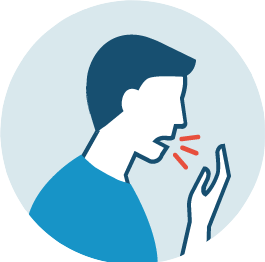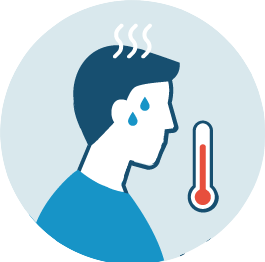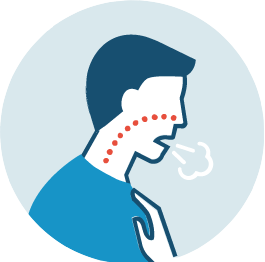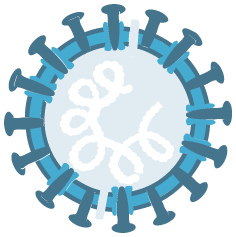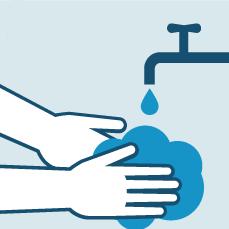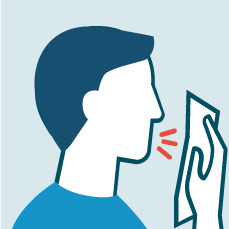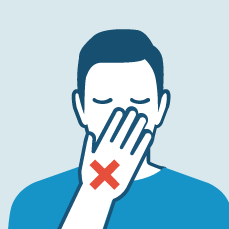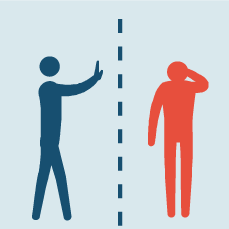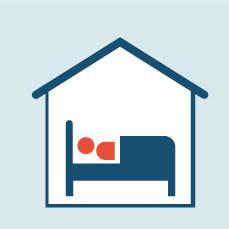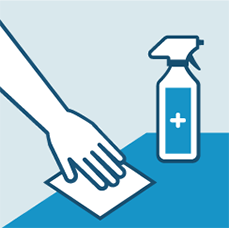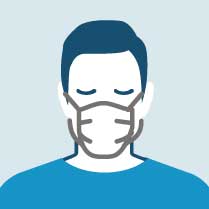Disclaimer: We are not responsible for any liability, adverse reactions, or damage, caused or alleged to be caused directly or indirectly as a result of the use, or health or medical information on this website. By voluntarily creating and using any links provided here, you assume the risk of any potential injury or reaction that may result. The links to the following website is the best source of up-to-date information “at a glance” about the Coronavirus. It’s managed by Johns Hopkins University & Medicine. Click Here To Stay Informed.
The links to the following website is the best source of up-to-date information “at a glance” about the Coronavirus. It’s managed by Johns Hopkins University & Medicine. Click Here To Stay Informed.
- Wash your hands regularly for 20 seconds, with soap and water or alcohol-based hand rub
- Cover your nose and mouth with a disposable tissue or flexed elbow when you cough or sneeze
- Avoid close contact (1 meter or 3 feet) with people who are unwell
- Stay home and self-isolate from others in the household if you feel unwell
- Touch your eyes, nose, or mouth if your hands are not clean
 More Cornonavirus Information
More Cornonavirus Information
- The virus is not a living organism, but a protein molecule (DNA) covered by a protective layer of lipid (fat), which, when absorbed by the cells of the ocular, nasal or buccal mucosa, changes their genetic code (mutation) and convert them into aggressor and multiplier cells.
- Since the virus is not a living organism but a protein molecule, it is not killed, but decays on its own. The disintegration time depends on the temperature, humidity and type of material where it lies.
- The virus is very fragile; the only thing that protects it is a thin outer layer of fat. That is why any soap or detergent is the best remedy, because the foam CUTS the FAT (that is why you have to rub so much: for 20 seconds or more, to make a lot of foam). By dissolving the fat layer, the protein molecule disperses and breaks down on its own.
- HEAT melts fat; this is why it is so good to use water above 25 degrees Celsius for washing hands, clothes and everything. In addition, hot water makes more foam and that makes it even more useful.
- Alcohol or any mixture with alcohol over 65% DISSOLVES ANY FAT, especially the external lipid layer of the virus.
- Any mix with 1 part bleach and 5 parts water directly dissolves the protein, breaks it down from the inside.
- Oxygenated water helps long after soap, alcohol and chlorine, because peroxide dissolves the virus protein, but you have to use it pure and it hurts your skin.
- NO BACTERICIDE SERVES. The virus is not a living organism like bacteria; they cannot kill what is not alive with antibiotics, but quickly disintegrate its structure with everything said.
- NEVER shake used or unused clothing, sheets or cloth. While it is glued to a porous surface, it is very inert and disintegrates only between 3 hours (fabric and porous), 4 hours (copper, because it is naturally antiseptic; and wood, because it removes all the moisture and does not let it peel off and disintegrates), 24 hours (cardboard), 42 hours (metal) and 72 hours (plastic). But if you shake it or use a feather duster, the virus molecules float in the air for up to 3 hours, and can lodge in your nose.
- The virus molecules remain very stable in external cold, or artificial as air conditioners in houses and cars. They also need moisture to stay stable, and especially darkness. Therefore, dehumidified, dry, warm and bright environments will degrade it faster.
- UV LIGHT on any object that may contain it breaks down the virus protein. For example, to disinfect and reuse a mask is perfect. Be careful, it also breaks down collagen (which is protein) in the skin, eventually causing wrinkles and skin cancer.
- The virus CANNOT go through healthy skin.
- Vinegar is NOT useful because it does not break down the protective layer of fat.
- NO SPIRITS, NOT even VODKA. The strongest vodka is 40% alcohol, and you need 65%.
- LISTERINE might be better. It is 65% alcohol.
- The more confined the space, the more concentration of the virus there can be. The more open or naturally ventilated, the less.
- This is a critical. You have to wash your hands before and after touching mucosa, food, locks, knobs, switches, remote control, cell phone, watches, computers, desks, TV, etc. And when using the bathroom.
- You have to HUMIDIFY HANDS DRY from so much washing them, because the molecules can hide in the micro cracks. The thicker the moisturizer, the better.
- Keep your NAILS SHORT so that the virus does not hide there.
Recently the New York Times asked experts how best to clean your home during a viral outbreak like the Coronavirus outbreak. We thought we would share this informative article.
We asked the experts how best to clean our homes during a viral outbreak. After they taught us the proper technique (above), we had a few more questions:
How often should I do this?
Every day. (In between regular cleanings.)
Will wipes work?
Yes. Look for sprays or wipes that promise to kill 99.9 percent of germs.
What if I don’t have cleaning sprays or wipes?
Washing with soapy water should do the trick: a few drops of dish soap to eight ounces of water. Although soap and water will not kill all germs, scrubbing with soapy water should be effective in removing coronavirus and other germs from surfaces.
What’s a high-touch surface?
All those places where you and your family leave a million fingerprints every day. (Clean bathroom surfaces last.)
• Door knobs
• Light switches
• Refrigerator and microwave doors
• Drawer pulls
• TV remote
• Counters and table tops where you cook and eat
• Toilet handles
• Faucet handles
Tara Parker-Pope is the founding editor of Well, The Times’s award-winning consumer health site. She won an Emmy in 2013 for the video series “Life, Interrupted” and is the author of “For Better: The Science of a Good Marriage.” @taraparkerpope
How To Sanitize Your Smartphone During Coronavirus Outbreak
Consumer Reports.org posted a great article on how to keep your smartphone clean.
There’s more to keeping your smartphone clean than just a microfiber cloth.
Amid growing concerns about the spread of COVID-19, the disease caused by a novel coronavirus, Apple has updated its guidance on how to keep iPhones and other electronic devices clean and free of germs, telling users that it is indeed safe to use alcohol to wipe the product’s screen and body.
This coronavirus has quickly spread around the globe and is now advancing across the U.S. Symptoms are usually mild but can be severe, especially in older adults and in people with underlying health conditions.
Studies have shown that smartphones are a breeding ground for germs and other pathogens, making it important to keep them clean. That’s certainly true for the novel coronavirus, which research suggests may survive on surfaces for hours or even days.
Prior to Apple’s updated guidance, published Monday, there was palpable confusion about whether using alcohol might damage a smartphone, particularly the special “oleophobic” coating that helps prevent fingerprints from building up on the touch-screen display.
“Using a 70 percent isopropyl alcohol wipe or Clorox Disinfecting Wipes, you may gently wipe the hard, nonporous surfaces of your Apple product, such as the display, keyboard, or other exterior surfaces,” Apple said.
The company recommends that you power the device down first and avoid using bleach, submerging the unit in cleaning agents, or allowing moisture to enter any opening in the shell.
“Don’t use [the wipes] on fabric or leather surfaces,” Apple adds.
In an email to Consumer Reports, a Google representative confirmed that it’s okay to use isopropyl alcohol wipes on the company’s devices (including the Pixel smartphone), without fear of causing damage. Consumer Reports has asked Samsung for similar confirmation on the use of wipes on its devices but has not yet received a response. We’ll update this article if that changes.
The Centers for Disease Control and Prevention notes that hand sanitizers containing at least 60 percent alcohol have been shown to be effective at eliminating germs.
Consumers who shield their phones from harm with a screen protector and/or a protective case may have an even easier way to keep the device clean: plain old soap and water.
James Dickerson, Ph.D., Consumer Reports’ chief scientific officer, says he regularly washes his smartphone case and screen cover in his sink with soap and water. And according to the CDC, soap and water are more effective at eliminating germs than alcohol-based hand sanitizers.
“So if people have those types of covers, that’s probably the best thing they can do,” he says. “They don’t have to go out and buy special sanitizers or anything like that. Just scrub it down.”
Do not, however, do that with a case that features a built-in battery for recharging on the go, he adds.
As for how often you should clean your smartphone, Dickerson says that varies based on your situation. A physician who sees patients regularly, he explains, will want to wipe down the phone several times a day. But the average consumer can do so less frequently. It all depends on how often you interact with other people.
More broadly, Dickerson says, consumers should look to official, reputable sources for information as the situation unfolds.
“You have to be vigilant,” he says. “Take in information from trusted healthcare professionals and not just social media influencers.”
 A one-page, printable guide for preparing to shelter at home
A one-page, printable guide for preparing to shelter at home
Our recommendations for surviving boredom, loneliness, and the Coronavirus.
Mr. Free Spirit Speaks About the Coronavirus
Mr. Free Spirit has been busy living the fantastic retired life. However, this Coronavirus (COVID-19) has made him spring into action.
If you are retired or getting ready to retire be prepared to stay aware of world events. It’s not necessary to panic but, it is necessary to be aware. Panic and watching the news about Coronavirus (COVID-19) constantly will cause mental stress. However, you must stay vigilant. I am NOT an authority as to what affect you either will have physically or mentally but being retired affords me the time to research. We are going into a social normal era; fear will enter your judgement concerning your next move.
Just think I have a new house and a new car, but if I knew Coronavirus (COVID-19) was coming and making the stock market tank and affect the interest rate, I would have waited. What or how will Coronavirus (COVID-19) affect you? read below:
What can older/retired adults do to reduce their risk of illness?
Older adults and people with chronic health conditions, such as diabetes, heart disease and lung ailments, are more likely than younger, healthier people to experience serious symptoms from the illness caused by the Coronavirus (COVID-19).
In the U.S., that means more than 105 million Americans are at increased risk for complications if infected due to age or comorbidities, an analysis from the Kaiser Family Foundation shows.
Risk of death from the Coronavirus also is higher in older adults, starting at age 60,
The Centers for Disease Control and Prevention (CDC) has issued specific guidance for older adults and people who have chronic medical conditions. Here’s what the agency recommends:
Avoid crowds, rethink daily activities
A 15-day plan to slow the spread of the Coronavirus in the U.S. It’s centered on individuals avoiding groups of more than 10 people — a move that doubles down on previous recommendations that Americans need to distance themselves from one another.
Many states, cities and communities are taking social distancing recommendations seriously by temporarily shuttering bars and restaurants, closing schools and setting limits on the number of people who can gather in one place. Some areas of the U.S. are under shelter-in-place orders to keep crowds from spreading COVID-19.
The CDC also has advised that nursing homes and long-term care facilities ban outside visitors, guidance that comes as a long-term care facility in Washington battles a COVID-19 outbreak that has resulted in multiple deaths.
Limiting contact with others is one way to slow the spread of the epidemic and protect high-risk populations from infection. Public health experts also are advising that people wash their hands often and clean and disinfect frequently touched surfaces.
Stock up on supplies
Older Americans and adults who routinely take medications should make sure they have “adequate supplies” on hand, enough to last two weeks to a month.
It’s also important to stock up on over-the-counter medications to treat fever, cough and other symptoms, as well as tissues and common medical supplies.
Major health insurers have pledged to relax prescription refill limits on “maintenance medications” in the wake of the Coronavirus outbreak. Prescription refill limits are also being waived for many Medicare Advantage and Part D beneficiaries.
If you run into difficulty stocking up on your prescriptions at the pharmacy, consider refilling your medications with a mail-order service, the CDC says. You can also ask your physician to switch your prescription from a 30-day supply to a 90-day supply to make sure you have enough medication to get through a potential COVID-19 outbreak in your community.
And make sure you have enough food in the house in case you have to stay home for an extended period.
Appearing on NBC’s Meet the Press, Dr. Anthony Fauci, an immunologist and Director of the National Institute of Allergy and Infectious Diseases at the National Institutes of Health (NIH), said Americans “should be prepared that they’re going to have to hunker down significantly more than we as a country are doing.”
What’s the best way to protect myself?
Limit exposure. That’s the best way to prevent the spread of COVID-19. This means staying home as much as you can and minimizing contact with others, especially crowds. Avoid all nonessential travel and consider meal pickup and delivery options as an alternative to dining out.
Health officials also advise taking everyday steps that can prevent the spread of respiratory viruses. Wash your hands often with soap and water (scrub for at least 20 seconds) and use alcohol-based hand sanitizer when soap is not an option. Avoid touching your eyes, nose and mouth with unwashed hands, and cover your coughs and sneezes.
Some other advice: Stay home when you are sick, keep a distance of at least six feet between you and others, and clean and disinfect frequently touched objects and surfaces.
What about travel?
The CDC advises against all nonessential travel, domestic or foreign, and has issued a strong warning against cruise travel during the pandemic.
The government has banned travelers from more than 30 countries to the U.S., including Ireland and the United Kingdom. Several countries around the world are doing the same to slow the spread of the virus. The U.S.-Canada border also is closed for nonessential travel.
. How is the Coronavirus spreading?
Much of what experts know is based on what is known about similar Coronaviruses. When person-to-person transmission occurred with Middle Eastern respiratory syndrome Coronavirus (MERS-CoV) and severe acute respiratory syndrome Coronavirus (SARS-CoV), respiratory droplets from coughs and sneezes from an infected person were the likely culprit, according to the CDC. Those droplets can land in the mouths or noses of nearby people or be inhaled into the lungs.
It may be possible to get COVID-19 by touching a contaminated surface or object and then touching your mouth, nose or eyes, “but this is not thought to be the main way the virus spreads,” the CDC says.
Health officials are still working to better understand how easily the virus is spread from person to person. It may be possible for an infected person to spread the virus before exhibiting symptoms. However, people are thought to be most contagious when they are sick with the symptoms of the virus, the CDC says.
Coronavirus at a Glance: Infographic
Coronavirus at a Glance
Covid-19 SYMPTOMS may develop within 14 days of exposure and include*:
-
Cough
-
Fever
-
Shortness of breath
COVID-19 BY THE NUMBERS
115,997
Confirmed cases worldwide**
THE BEST WAYS TO PROTECT YOURSELF
-
Wash your hands frequently and thoroughly, using soap and water for at least 20 seconds. Use alcohol-based hand sanitizer if soap and water aren’t available.
-
Cough or sneeze into a tissue or flexed elbow, then throw the tissue in the trash.
-
Avoid touching your eyes, nose or mouth with unwashed hands.
-
Avoid close contact with people who are sick, sneezing or coughing.
-
Stay home when you are ill.
-
Clean and disinfect surfaces and objects that people frequently touch.
-
Only wear a face mask if you have respiratory symptoms or are caring for someone with respiratory symptoms.





:no_upscale()/cdn.vox-cdn.com/uploads/chorus_asset/file/19819535/stayinghome_edit.png?w=1200&ssl=1)


